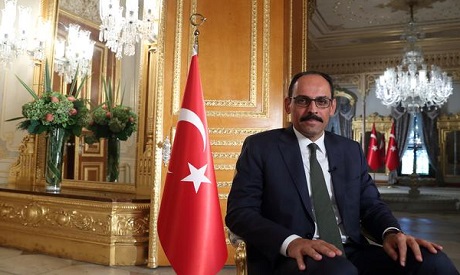
FILE PHOTO: Turkish President Tayyip Erdogan's spokesman Ibrahim Kalin is pictured during an interview with Reuters in Istanbul, Turkey September 27, 2020. REUTERS
Turkish President Recep Tayyip Erdogan’s spokesman said on Monday that Ankara is ready to open a ‘new chapter’ with the Gulf and discuss the eastern Mediterranean crisis and the developments in Libya with Egypt.
Speaking to Bloomberg, Ibrahim Kalin said “a new chapter can be opened, a new page can be turned in our relationship with Egypt, as well as other Gulf countries, to help regional peace and stability.”
He described Egypt as "an important country in the Arab world and remains the brain of the Arab World, is the heart of the Arab world."
"We are interested in talking to Egypt on maritime issues in the eastern Mediterranean as well as other issues in Libya, the peace process, and the Palestinians. We can address a number of these issues, we can lower tensions and that kind of a partnership can help regional stability from north Africa to the eastern Mediterranean," Kalin said.
Kalin's statements come two months after the Arab Quartet - Egypt, Saudi Arabia, UAE and Bahrain - ended a four-year political boycot of Qatar, a regional ally of Turkey, that involved an embargo on trade, travel, and diplomatic relations with Doha.
The Arab quartet had accused Qatar of backing Islamist extremist groups in the region, which Doha denied.
Egypt has also accused Ankara of providing a safe haven for the terrorist-designated Muslim Brotherhood.
Kalin’s statements also come as a new Libyan parliament meets Monday ahead of a vote on a new interim unity government for the divided country, a crucial step toward December's elections and stability after a decade of violent turmoil.
Turkish aggression in Libya has put Ankara at loggerheads with Cairo, which has rejected all foreign intervention in its neighbour's affairs.
For years, Turkey has provided political and military support to the Tripoli-based Government of National Accord (GNA), while the Tobruk government, backed by Commander Khalifa Haftar’s Libyan National Army (LNA), received backing from Egypt, the United Arab Emirates (UAE), France, and Russia.
Last August, a UN-sponsored peace process resulted in a ceasefire between rival authorities in Tripoli and Tobruk that ended a six-year split.
The Libyan prime minister and presidential council in the transitional set-up have agreed to hold elections later this year, work on the release of all prisoners, protect oil and gas facilities, and resume all production and export activities.
Egypt, which hosted rounds of talks for political reconciliation between rival Libyan parties, has maintained that an end to foreign intervention, including Turkish intervention, in Libyan affairs and the departure of all foreign troops and thousands of mercenaries is key to achieving peace and stability in Libya.
Turkish aggression in the east Mediterranean has also further strained relations with Egypt.
In 2019, Turkey signed a maritime agreement with the prime minister of the Tripoli government, which was decried by Egypt, Cyprus, and Greece as a gross violation of their sovereignty and international law.
Egypt has called on any future Libyan government to declare the Turkey-Tripoli maritime demarcation deal void and null.
Cairo, Athens, and Nicosia has also denounced Turkish excavations for natural gas in Greek and Cypriot waters as a flagrant violations of territorial waters.
Short link: